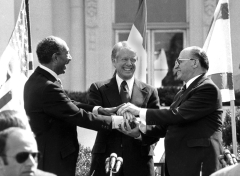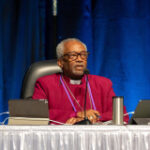(RNS) — My late parents taught me a cardinal rule of etiquette and good taste: Always speak well of the dead. That is what I have sought to do in the days since the death of former President Jimmy Carter, on Sunday (Dec. 29), at the age of 100.
He died, as the Bible would put it, at a good old age. There was much good in his legacy: the 1978 Camp David Accords, in which Carter brought Anwar Sadat and Menachem Begin together to negotiate a peace treaty between Egypt and Israel; Carter’s post-White House activism with Habitat for Humanity; his work through The Carter Center in helping combat diseases in Africa; even his 1979 speech in which he criticized Americans for self-indulgence, consumption and pursuing self-interest. His critics decried his preaching; I thought that he was spot-on.
But honesty also demands a deep dive into Carter’s legacy regarding Israel and the Middle East. (Read, in particular, this assessment by his former adviser, Kenneth Stein.)
Nearly 20 years ago, I read and reviewed Carter’s 2006 book “Palestine: Peace Not Apartheid.” Back then, the book upset me, as it did many others. Neither time nor memory has chipped away at the sources of our disturbance.
At that time, we had no idea that his words would spawn other words that would become even more hateful, and that, particularly after Oct. 7, such hatred would become mainstream.
Let us start with the word “apartheid” in the title. The word stings now; it stung back when the book first appeared. In fact, that is its precise intent — to sting, provoke and malign. Carter’s language came straight out of Arab and Third World rhetoric, out of the United Nations’ 2001 conference on racism at Durban, the Woodstock of Jew-hatred.
Yes, the ongoing occupation of the West Bank and the plight of Palestinians are morally problematic and maddening. I wish that it would end, and I am far from alone. I equally decry the presence of such racists as Itamar Ben-Gvir, Israel’s national security minister, and Bezalel Smotrich, its finance minister. I bemoan the callousness that has emerged in sectors of the Israeli population.
But to equate Israel with apartheid-era South Africa has only one intent: to delegitimize and demonize the Jewish state.
Carter’s “Palestine: Peace Not Apartheid” is riddled with errors, misjudgments and false claims. Its understanding of history is woefully inadequate. When Syria’s late dictator, Hafez Assad, told the former president that the Palestinians had lived in the land of Israel for thousands of years, Carter accepted this historical distortion without question.
When it came to Israel’s leaders, Carter had nothing good to





